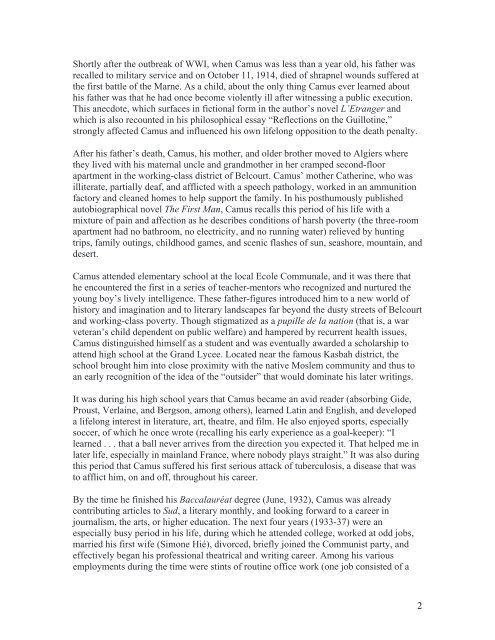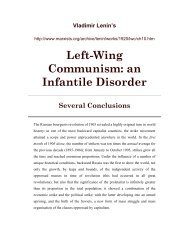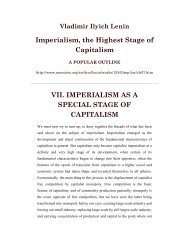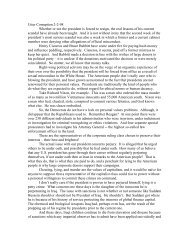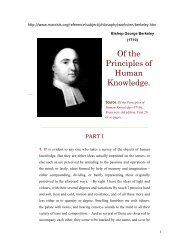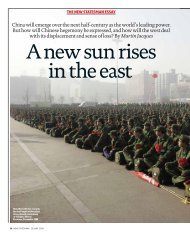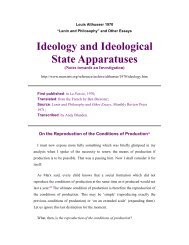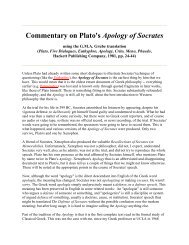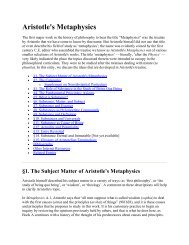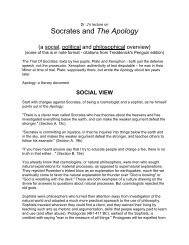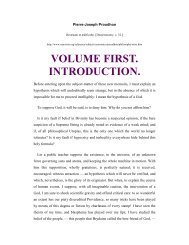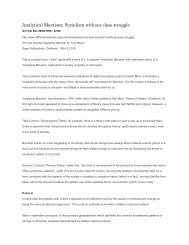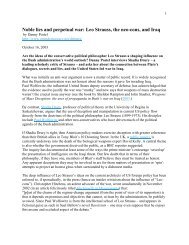Albert Camus (1913â1960) - Richard Curtis
Albert Camus (1913â1960) - Richard Curtis
Albert Camus (1913â1960) - Richard Curtis
Create successful ePaper yourself
Turn your PDF publications into a flip-book with our unique Google optimized e-Paper software.
Shortly after the outbreak of WWI, when <strong>Camus</strong> was less than a year old, his father was<br />
recalled to military service and on October 11, 1914, died of shrapnel wounds suffered at<br />
the first battle of the Marne. As a child, about the only thing <strong>Camus</strong> ever learned about<br />
his father was that he had once become violently ill after witnessing a public execution.<br />
This anecdote, which surfaces in fictional form in the author’s novel L’Etranger and<br />
which is also recounted in his philosophical essay “Reflections on the Guillotine,”<br />
strongly affected <strong>Camus</strong> and influenced his own lifelong opposition to the death penalty.<br />
After his father’s death, <strong>Camus</strong>, his mother, and older brother moved to Algiers where<br />
they lived with his maternal uncle and grandmother in her cramped second-floor<br />
apartment in the working-class district of Belcourt. <strong>Camus</strong>’ mother Catherine, who was<br />
illiterate, partially deaf, and afflicted with a speech pathology, worked in an ammunition<br />
factory and cleaned homes to help support the family. In his posthumously published<br />
autobiographical novel The First Man, <strong>Camus</strong> recalls this period of his life with a<br />
mixture of pain and affection as he describes conditions of harsh poverty (the three-room<br />
apartment had no bathroom, no electricity, and no running water) relieved by hunting<br />
trips, family outings, childhood games, and scenic flashes of sun, seashore, mountain, and<br />
desert.<br />
<strong>Camus</strong> attended elementary school at the local Ecole Communale, and it was there that<br />
he encountered the first in a series of teacher-mentors who recognized and nurtured the<br />
young boy’s lively intelligence. These father-figures introduced him to a new world of<br />
history and imagination and to literary landscapes far beyond the dusty streets of Belcourt<br />
and working-class poverty. Though stigmatized as a pupille de la nation (that is, a war<br />
veteran’s child dependent on public welfare) and hampered by recurrent health issues,<br />
<strong>Camus</strong> distinguished himself as a student and was eventually awarded a scholarship to<br />
attend high school at the Grand Lycee. Located near the famous Kasbah district, the<br />
school brought him into close proximity with the native Moslem community and thus to<br />
an early recognition of the idea of the “outsider” that would dominate his later writings.<br />
It was during his high school years that <strong>Camus</strong> became an avid reader (absorbing Gide,<br />
Proust, Verlaine, and Bergson, among others), learned Latin and English, and developed<br />
a lifelong interest in literature, art, theatre, and film. He also enjoyed sports, especially<br />
soccer, of which he once wrote (recalling his early experience as a goal-keeper): “I<br />
learned . . . that a ball never arrives from the direction you expected it. That helped me in<br />
later life, especially in mainland France, where nobody plays straight.” It was also during<br />
this period that <strong>Camus</strong> suffered his first serious attack of tuberculosis, a disease that was<br />
to afflict him, on and off, throughout his career.<br />
By the time he finished his Baccalauréat degree (June, 1932), <strong>Camus</strong> was already<br />
contributing articles to Sud, a literary monthly, and looking forward to a career in<br />
journalism, the arts, or higher education. The next four years (1933-37) were an<br />
especially busy period in his life, during which he attended college, worked at odd jobs,<br />
married his first wife (Simone Hié), divorced, briefly joined the Communist party, and<br />
effectively began his professional theatrical and writing career. Among his various<br />
employments during the time were stints of routine office work (one job consisted of a<br />
2


